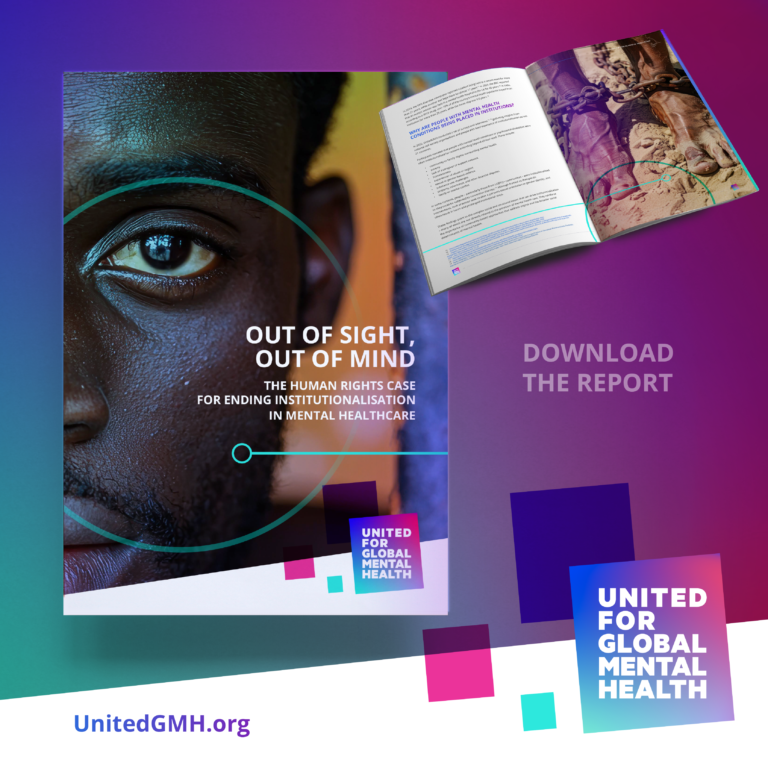
8th JULY 2025
New global report reveals at least 8 million people are admitted to mental hospitals annually, many facing long stays and abusive conditions
A new report released today reveals at least 8.4 million people are admitted to mental hospitals annually, many facing long stays under abusive and degrading conditions, regardless of whether they are in high- middle- or low-income countries. The report – Out of Sight, Out of Mind: The Human Rights Case for Ending Institutionalisation – reveals how mental health care today is still heavily focused on long-stay psychiatric institutions. Of the limited national budgets for mental health, an average of 66% globally is spent on institutions.
Launched by United for Global Mental Health, the report also shows long stays and severe human rights abuses are common – physical, emotional and mental. The global survey of people with lived experience included in the report reveals forced admissions and treatment of those with mental health conditions are common in institutions, whilst neglect, understaffing and unsanitary living conditions are widely reported. Physical and mechanical restraint (straps, belts, cage beds etc) are commonly used across the globe.
“So many of those in mental health institutions are there involuntarily, unable to speak up for themselves or have anyone speak up for them. They are out of sight and out of mind. In far too many cases, their care feels more like a sentence,” said Ali Hasnain, lead author of the new report. “They are being sentenced in some cases to a lifetime away from their families and loved ones, locked away in a facility far removed from the community, exposed to physical, sexual and emotional abuse without any recourse for justice. People are restrained, shackled, chained, at times overmedicated and treated without dignity. The living conditions in such institutions can be poor with neglect, malnutrition, dilapidated facilities and understaffing being far too common.”
The report also reveals that even once released from institutions, people are sentenced to exclusion from a normal life in their communities, facing stigma, being labelled as dangerous, unable to find work, and in too many cases, having nowhere to go and no family to return to.
The report is part of United for Global Mental Health’s call for an end to such institutionalisation. Recommendations include shifting to a human-centric approach to care that is focused on recovery and on-going support where needed to allow for reintegration into communities for people affected to be able to live their lives, free from stigma and discrimination. This call is backed by the World Health Organization (WHO) and a range of other organisations working to urgently reform mental health care and is a focus ahead of this year’s UN High Level Meeting on NCDs and Mental Health which provides a unique opportunity to secure new political and financial commitments from governments.
Some countries featured in the report demonstrate how reform of mental health institutional care is possible, from Argentina and Brazil to Sri Lanka, Italy, Indonesia and South Africa.
“Mental health care today is still heavily focused on long-stay psychiatric institutions and specialized care treatment facilities, with persistent abuses and lasting stigma. But some countries have demonstrated how the mental health care landscape can be transformed and restructuring care from institutions to the community is possible,” said Sarah Kline, CEO of United for Global Mental Health. “A shift to mental health care that is focused on recovery and reintegration into communities is possible and long overdue. It will happen through laws and policies that respect human rights, strong plans to enable healthcare systems to transition to providing care close to where we study, work and play, as well as through a well equipped and supported mental health workforce.”
Note to Editors:
- The term “institution” refers not only to mental hospitals, psychiatric institutions and what we traditionally classify as asylums, but all places where the practices associated with institutionalisation exist, including some forensic hospitals, community and residential care homes, prayer camps etc.
- WHO definition: Mental health conditions covers mental disorders, psychosocial disabilities and other mental states associated with significant distress, impairment in functioning, or risk of self-harm. Full list of conditions at the end of this document
- Long stays in mental health institutions are common – in the Americas and the Eastern Mediterranean Region, more than 25% of all people were kept in institutions for up to 5 years. In India the average stay for all inpatients in India was almost 10 years and over 10% of all inpatients stayed more than 25 years. The UK has reports of a patient being held in a secure ward for more than 21 years, while another stayed for almost 17 years.